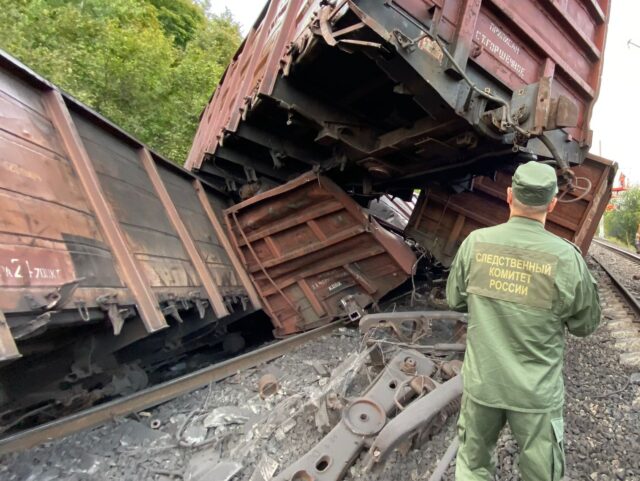A railway behind the front lines of the Ukraine war was bombed and taken out of service this week with a freight train destroyed, Ukraine claims credit while Russia says it is launching a criminal terrorism investigation.
A freight train was derailed with serious damage to the locomotive and 11 boxcars thrown off the track on Tuesday night, closing the rail line leading to Valuyki, Belgorod from the Russian interior. The railhead is just 50 miles away from the frontline fighting at the Vovchansk ‘meatgrinder’ on the Kharkiv front.
Ukrainian state media asserts the derailment was in fact an attack by their partisans, saying the line was blocked by a joint operation of their defence intelligence establishment and Ukrainian special forces. Kyiv claimed the freight train was giving logistical support to the Russian army and it was derailed by means of explosives, “paralysing” a main transport artery.
The Russians, for their part, insisted the train wagons damaged in the strike were empty, and said there were no casualties. Moscow confirmed the track had been blocked and local trains were replaced with buses, while long-distance services were directed to other routes. Two recovery trains had been sent to the scene to clear the tracks.
The Western Region Investigative Department for Transport of the Investigative Committee of the Russian Federation said they had opened a criminal investigation under the Russian criminal code dealing with terrorist attacks, saying they believed the explosion had been caused by the “interference of an outsider”. Russian state media said one track on the two-track line was re-opened the following day, but no update has been given on the other, suggesting logistical supply in a region with bad roads so close to some of the hardest fighting of the war today remains disrupted by the partisan attack.
While the military application of railways lapsed in the minds of many Western military planners with the end of the Cold War era, they have made a considerable comeback in the course of the Ukraine war, where both sides rely heavily on railway infrastructure to move men and supplies in areas where roads have long been of poor quality and were air transport is next to impossible.
With this return to prominence has some an increased strategic focus, with the railways themselves coming under heavy attack. The early days of the war saw concentrated Russian strikes on Ukrainian railway infrastructure — likely to slow the country receiving external aid — and this continues today. Ukraine in turn have repeatedly used partisan saboteur teams to blow up Russian trains inside Russia and Russian-occupied Ukraine.
Russia operates a series of well armed military trains to deter saboteurs but it has been met with limited success, the distances involved making effectively guarding the railways a near impossible task.

COMMENTS
Please let us know if you're having issues with commenting.